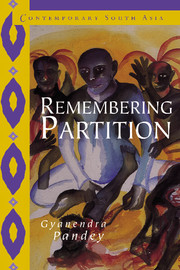Book contents
- Frontmatter
- Contents
- Acknowledgments
- List of abbreviations
- 1 By way of introduction
- 2 The three partitions of 1947
- 3 Historians' history
- 4 The evidence of the historian
- 5 Folding the local into the national: Garhmukhteshwar, November 1946
- 6 Folding the national into the local: Delhi 1947–1948
- 7 Disciplining difference
- 8 Constructing community
- Select bibliography
- Index
8 - Constructing community
Published online by Cambridge University Press: 06 January 2010
- Frontmatter
- Contents
- Acknowledgments
- List of abbreviations
- 1 By way of introduction
- 2 The three partitions of 1947
- 3 Historians' history
- 4 The evidence of the historian
- 5 Folding the local into the national: Garhmukhteshwar, November 1946
- 6 Folding the national into the local: Delhi 1947–1948
- 7 Disciplining difference
- 8 Constructing community
- Select bibliography
- Index
Summary
How is life and community to be reconstructed out of the contradictory and difficult ‘memories’ described in these pages? One possibility, widely enforced by individuals and communities, is to maintain individual silence, to leave the pain of events like Partition unspoken, to suppress it in the body. Alongside that, however, there is also the need for a public forgetting, that goes hand in hand with a recitation of past deeds.
There are two familiar procedures in such forgetting that readers will have encountered repeatedly in the preceding chapters. One is to transform such moments of violence and suffering into moments in a war (of liberation); the other, to represent it as part of someone else's history – what others did, or were responsible for. While the second move is observable very commonly indeed in the accounts of Partition survivors, it comes at times with an implicit recognition that the disorder is somehow part of our history too. These reconstructions of violence in the past are frequently forced to grapple with the question of the meaning of this violence for the community – past and present. In other words, they are compelled to pose the question of what constitutes the community, the subject of history, ‘us’ and ‘them’. Here, in the handling of the relationship between violence and community, I submit, Partition – and accounts of Partition – have something unusual to tell us.
- Type
- Chapter
- Information
- Remembering PartitionViolence, Nationalism and History in India, pp. 175 - 205Publisher: Cambridge University PressPrint publication year: 2001



